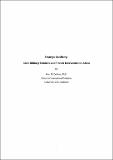Files in this item
Strategic satisficing : civil-military relations and French intervention in Africa
Item metadata
| dc.contributor.author | DeVore, Marc R. | |
| dc.date.accessioned | 2019-04-08T11:30:08Z | |
| dc.date.available | 2019-04-08T11:30:08Z | |
| dc.date.issued | 2019-04-03 | |
| dc.identifier | 256657838 | |
| dc.identifier | 6203589b-2986-4704-a400-be40f917d35e | |
| dc.identifier | 85065707545 | |
| dc.identifier | 000471817200003 | |
| dc.identifier.citation | DeVore , M R 2019 , ' Strategic satisficing : civil-military relations and French intervention in Africa ' , European Journal of International Security , vol. First View . https://doi.org/10.1017/eis.2019.1 | en |
| dc.identifier.issn | 2057-5645 | |
| dc.identifier.uri | https://hdl.handle.net/10023/17479 | |
| dc.description.abstract | Few issues are more important yet less understood than outside interventions in intra-state conflicts. Under what circumstances do intervening states further their interests and when, contrarily, do they plunge into quagmires? France is a critical case. It is, statistically, the world’s second intervenor and earned the sobriquet of Africa’s gendarme through frequent interventions in African wars. The ability of such a medium-sized state to intervene with greater regularity and ostensible success than larger powers raises questions about how France manages its interventions. Do French interventions draw on the French Army’s distinctive “school” of population-centric counterinsurgency, which emphasizes the need to militarize governance in pursuit of comprehensive victories? Or do the French Fifth Republic’s civil-military institutions encourage policymakers to carefully regulate force’s employment in pursuit of limited ends? This study draws on declassified archives to test which approach most characterizes French interventions. To preview my conclusions, strategic satisficing—the use of minimal force for short durations to produce satisfactory outcomes—distinguishes the Fifth Republic’s interventions from other powers’ practices and prior French counterinsurgencies. This particular form of interventionism enables France to influence a disproportionately large number of intra-state conflicts and maintain a network of security agreements with African states. | |
| dc.format.extent | 1038292 | |
| dc.language.iso | eng | |
| dc.relation.ispartof | European Journal of International Security | en |
| dc.subject | Chad | en |
| dc.subject | France | en |
| dc.subject | Africa | en |
| dc.subject | Counterinsurgency | en |
| dc.subject | Intervention | en |
| dc.subject | Satisficing | en |
| dc.subject | Civil-military relations | en |
| dc.subject | Civil wars | en |
| dc.subject | JZ International relations | en |
| dc.subject | T-NDAS | en |
| dc.subject.lcc | JZ | en |
| dc.title | Strategic satisficing : civil-military relations and French intervention in Africa | en |
| dc.type | Journal article | en |
| dc.contributor.institution | University of St Andrews. School of International Relations | en |
| dc.identifier.doi | https://doi.org/10.1017/eis.2019.1 | |
| dc.description.status | Peer reviewed | en |
| dc.date.embargoedUntil | 2019-04-03 |
This item appears in the following Collection(s)
Items in the St Andrews Research Repository are protected by copyright, with all rights reserved, unless otherwise indicated.

